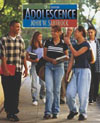|
 |  Adolescence, 9/e John W. Santrock,
University of Texas, Dallas
Cognitive Development
Web Links (Referenced in Text Margins)Piaget's Theory
(http://chd.gse.gmu.edu/immersion/knowledgebase/theorists/constructivism/Piaget.htm)
Read about numerous aspects of Piaget's Theory. |
 |  |  | Lev Vygotsky: Revolutionary Scientist
(http://www.westcoastcenter.com/vygotsky.html)
Explores many aspects of Vygotsky's theory including its ties to philosophical views, his unique contributions, historical contexts, and the importance of learning to use a culture's tools effectively. |
 |  |  | Vygotsky Links
(http://arts.uwaterloo.ca/~acheyne/chp.html)
Extensive Internet links to a wide range of ideas related to Vygotsky's views. |
 |  |  | Scaffolding
(http://edweb.sdsu.edu/people/bdodge/scaffolding.html)
Read about the application of scaffolding to learning and the Internet, scaffolding and Vygotsky's theory, and constructivist exercises. |
 |  |  | Cognitive Apprenticeship
(http://borg.lib.vt.edu/ejournals/JITE/v33n3/duncan.html)
Evaluates the importance of using a cognitive apprenticeship approach in classroom instruction; includes applications to industrial and technical education. |
 |  |  | Peer Tutoring
(http://www.nwrel.org/scpd/sirs/9/c018.html)
Examines research findings involving peer tutoring in math, language arts, and other subjects; describes high-needs students as tutors, why peer tutoring works, obstacles to us, how to address these obstacles, and provides abstracts of a number of articles on peer tutoring. |
 |  |  | Schools for Thought
(http://peabody.vanderbilt.edu/projects/funded/sft/general/sfthome.html)
This web site has information about Ann Brown's Fostering a Community of Learners program. |
 |  |  | Strategies
(http://www.psy.cmu.edu/psy/faculty/rsiegler.html)
This article is mainly based on an interview with Robert Siegler, a leading expert on the information processing approach. In the interview, Siegler discusses the importance of strategies in learning. |
 |  |  | Memory Links
(http://www.exploratorium.edu/memory/links.html)
Lots of good links to information about memory, including memory and computers, how and why people remember, forgetting, and memory games. |
 |  |  | Exploring Critical Thinking
(http://www.kcmetro.cc.mo.us/longview/ctac/reading.htm)
Critical Thinking Resources
http://www.indiana.edu/~eric_rec/bks/ct.html
Extensive links to information about critical thinking, including a brief history of the concept, recommended readings, basic questions and answers, and many critical thinking resources for teachers. |
 |  |  | Odyssey of the Mind
(http://www.odysseyofthemind.org/)
A world-wide program that promotes creative, team-based problem-solving for kindergarten-college aged students. |
 |  |  | The Jasper Project
(http://peabody.vanderbilt.edu/projects/funded/jasper/Jasperhome.html)
Explores what the Jasper Project is, how it is different from many other projects, examples of Jasper adventures, Jasper in the classroom, and Jasper-related projects. |
 |  |  | Teresa Amabile's Research
(http://dor.hbs.edu/fi_redirect.jhtml?facInfo=bio&facEmId=tamabile)
Teresa Amabile, a leading researcher in creativity discusses her current research interests and lists her publications. |
 |  |  | Harvard Project Zero
(http://pzweb.harvard.edu)
Project Zero's mission is to enhance learning, thinking, and creativity in the arts and other disciplines; this web site describes the Project's current directions and research, which include creativity and leadership, art works for schools, a visual thinking curriculum, an education and arts project, and Arts PROPEL, which involves an integration of teaching and assessment. |
 |  |  | Csikszentmihalyi's Ideas
(http://www.newhorizons.org/crfut_csikszent.html)
This article by Csikszentmihalyi presents his thoughts about education. |
 |  |  | Self-Regulatory Learning
(http://www.valdosta.edu/~whuitt/psy702/files/selfreg.html)
The full-text of an article, "Feedback and self-regulated learning: A theoretical synthesis," that explores many dimensions of self-regulatory learning. |
 |  |  | Mental Measurements Yearbook
(http://www.unl.edu/buros)
The web site of the Buros Institute of Mental Measurements, which publishes the Mental Measurements Yearbook, an extensive description and evaluation of tests in many areas. You can learn more about tests in such areas as achievement, intelligence, personality, and vocations. |
 |  |  | Alfred Binet
(http://www.indiana.edu/~intell/binet.html)
Includes a biography of Binet and citations of his work. |
 |  |  | Sternberg's Theory
(http://www.uwsp.edu/education/lwilson/learning/sternb1.htm)
An Interview with Howard Gardner
http://www.ed.psu.edu/insys/ESD/Gardner/vidmenu.html
Gardner elaborates on his view of multiple intelligences and their application to education. |
 |  |  | Multiple Intelligences Links
(http://www.angelfire.com/oh/themidas/links.html)
Extensive links to web sites with information about Gardner's multiple intelligences view, including how technology can be used to enhance the eight intelligences, a multiple intelligences bookshelf, and Gardner's personal web site. |
 |  |  | Social Cognition
(http://www.psych.purdue.edu/~esmith/scarch.html)
Lots of Internet connections to web sites on social cognition. |
|
|



 2003 McGraw-Hill Higher Education
2003 McGraw-Hill Higher Education